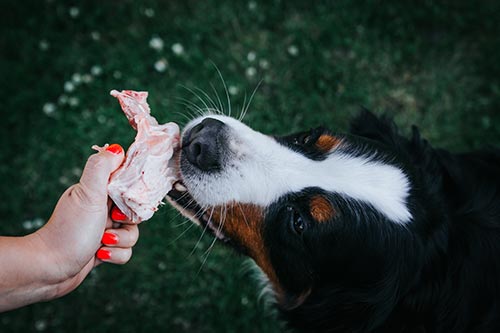Turkey is a common food during the holiday season, and you might wonder if it’s safe to share with your dog. While turkey can be a healthy protein for dogs, there are some important things to consider before feeding it to your pet. In this blog, we’ll explore whether turkey is safe for dogs to eat, the benefits and risks, and what to keep in mind when offering it. If you have specific questions about your dog’s diet, contact Boulder Veterinary Hospital at (303) 442-6262 for more information or to schedule an appointment with our team.
Is Turkey Safe for Dogs?
Yes, dogs can eat turkey, but it depends on how the turkey is prepared and what parts you plan to give them. Plain, cooked turkey without seasoning, skin, or bones can be a healthy source of protein for your dog. Turkey is lean, which makes it a good option for dogs that may need to watch their weight. However, not all turkey is safe, so you’ll need to be careful about how you offer it to your dog.
Cooked turkey meat, particularly white meat, is generally safe as long as it’s not seasoned with spices or herbs. You’ll want to avoid feeding your dog turkey that contains garlic, onion, or other seasonings that could upset their stomach or lead to more serious health issues. While turkey can be a great protein source, it’s important to offer it in moderation to prevent any potential problems.
What Are the Benefits of Feeding Turkey to Dogs?
Turkey is rich in protein, which supports muscle growth and energy levels in dogs. It also contains several vitamins and minerals, including B vitamins, selenium, and zinc, which help with overall health. Feeding plain turkey to your dog, especially as part of their regular meals, can add variety and additional nutrients to their diet.
Since turkey is a lean meat, it’s a great option for dogs that need lower-fat diets, such as those with pancreatitis or other health conditions that require reduced fat intake. When included in a balanced diet, turkey can contribute to healthy skin, a shiny coat, and a well-functioning immune system.
If you’re considering adding turkey to your dog’s diet, it’s always a good idea to speak with a veterinarian first. Our team at Boulder Veterinary Hospital can provide more detailed information based on your dog’s specific dietary needs and health.
What Are the Risks of Feeding Turkey to Dogs?
While turkey can be healthy, certain risks come with feeding it to dogs, particularly during holiday meals when the turkey is often prepared with rich seasonings. The biggest risk is feeding your dog turkey that contains bones, skin, or spices.
1. Bones
Turkey bones, especially when cooked, become brittle and can easily splinter. If your dog chews on cooked turkey bones, they may swallow sharp pieces that can cause damage to their digestive tract, leading to serious injuries or blockages. It’s best to avoid giving your dog any bones to prevent this risk.
2. Skin and Seasoning
Turkey skin is high in fat, which can be difficult for dogs to digest. Feeding them turkey skin, especially in large amounts, could lead to digestive issues like vomiting, diarrhea, or pancreatitis, a painful inflammation of the pancreas. Additionally, many turkeys are seasoned with herbs, salt, and spices, such as garlic or onion, which can be toxic to dogs. If you’re unsure about the seasoning used, it’s safer to avoid giving your dog turkey from the table.
3. Excess Fat
Even though turkey is lean meat, the way it’s prepared can add a lot of fat. Fatty trimmings or rich gravy can cause gastrointestinal upset, leading to issues like diarrhea or more severe conditions like pancreatitis. For dogs prone to these issues, it’s especially important to avoid giving them anything but plain, unseasoned turkey.
How to Safely Feed Turkey to Dogs
If you want to share turkey with your dog, the safest option is to cook plain, unseasoned turkey and offer it in moderation. You can boil or bake the turkey without adding any oils, butter, or spices. White meat is the healthiest choice because it contains less fat than dark meat.
When serving turkey, remove any skin and bones, and make sure the meat is fully cooked. Raw or undercooked turkey can contain harmful bacteria like salmonella, which can make your dog sick. You should also cut the turkey into small, bite-sized pieces to prevent choking.
For dog owners who want to incorporate turkey into their pet’s diet more regularly, you might consider commercially available dog foods that include turkey as a primary ingredient. These are formulated to ensure that the meat is balanced with other essential nutrients.
If you have any concerns or want advice on how to add turkey to your dog’s meals safely, feel free to reach out to our team at Boulder Veterinary Hospital.
Can Dogs Eat Turkey Deli Meat?
Turkey deli meat might seem like a convenient option, but it’s best to avoid giving it to your dog. Deli meats are often processed with high levels of sodium, preservatives, and other additives that aren’t safe for dogs. High salt content can lead to dehydration, and processed meats can contribute to long-term health problems like obesity or high blood pressure.
Additionally, turkey deli meat may contain seasonings like garlic or onion, which are harmful to dogs. It’s always safer to stick with fresh, plain turkey that you prepare yourself if you want to include it in your dog’s diet.
How Much Turkey Can You Give Your Dog?
Portion control is key when feeding turkey to your dog. Too much turkey can lead to weight gain or upset their stomach. A small amount of plain turkey can be a healthy treat, but it should only make up a small portion of your dog’s overall diet. Turkey should never replace your dog’s regular food, as they need a balanced diet that includes other sources of protein, fats, and carbohydrates.
Generally, treats like turkey should only make up about 10% of your dog’s daily caloric intake. If you’re unsure how much turkey is appropriate for your dog, we can help you figure out the right amount based on your pet’s size, weight, and overall health. Call Boulder Veterinary Hospital to discuss the best approach for feeding turkey to your dog and ensure they are getting the right balance of nutrients in their meals.
When Should You Avoid Feeding Turkey to Your Dog?
There are a few situations where you should avoid feeding your dog turkey altogether. If your dog has a history of pancreatitis, high-fat foods like turkey skin can trigger an episode. Additionally, if your dog has food allergies or sensitivities, turkey may cause digestive upset or allergic reactions. Some dogs might be allergic to poultry in general, so it’s important to monitor for any signs of discomfort, itching, or gastrointestinal issues if you introduce turkey into their diet.
If your dog shows any signs of illness or discomfort after eating turkey, contact us immediately. It’s always better to be cautious and get professional advice when it comes to your pet’s health.
Contact Boulder Veterinary Hospital for More Information
If you’re still wondering, “Can dogs eat turkey?” the answer is yes, with certain precautions. It’s important to offer plain, cooked turkey in moderation, avoid seasonings, and keep bones and skin out of your dog’s meals. While turkey can be a healthy addition to your dog’s diet, it’s always best to consult with a veterinarian before making any changes.
If you have any questions about your dog’s diet or want to schedule an appointment with our team, call Boulder Veterinary Hospital at (303) 442-6262. We’re here to help you make the best choices for your dog’s health and well-being.





